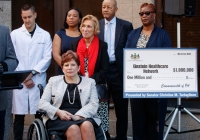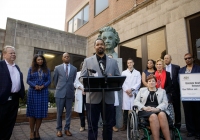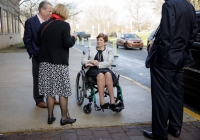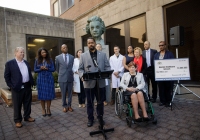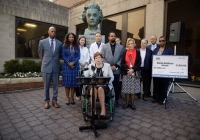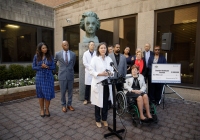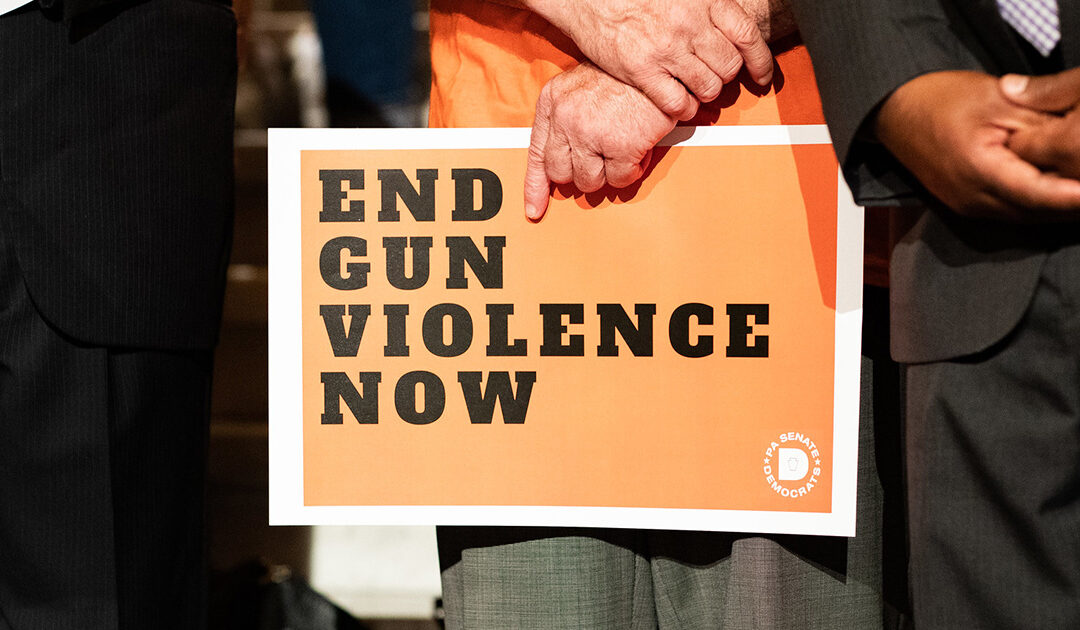
by Christin Brown | May 25, 2022 | News Releases
HARRISBURG – May 25, 2022 – Today, Pennsylvania Senate Democrats wrote the following letter to Republican leaders in response to rampant gun violence and mass shootings that have become too common in the United States. Just this year, 215 mass shootings have taken place in the country, with the devastating shooting that occurred at Robb Elementary School in Uvalde, Texas on May 24, 2022, being the 215th.
In the letter, the caucus calls on the Republican majority to act on “reasonable and responsible legislation and appropriations” that does not infringe on Second Amendment rights but will help keep guns away from bad actors and support gun violence prevention. Senate Democrats list seven bills that have been introduced to mitigate gun violence but have sat in committee with no discussion or votes. They also highlight how American Rescue Plan dollars and Pennsylvania’s current budget surplus can be used to help communities prevent horrific violence.
 Loading...
Loading...
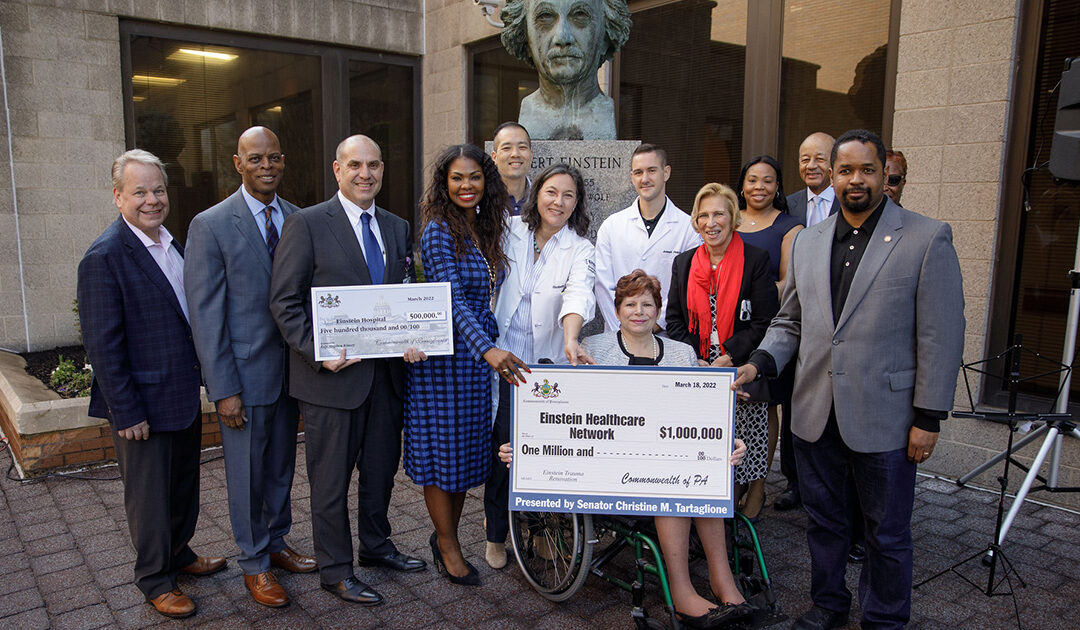
by Christin Brown | March 18, 2022 | feature, News Releases
Philadelphia − March 18, 2022 – Today Senator Christine Tartaglione (D-2) was joined by Senator Sharif Street (D-3) and Representative Stephen Kinsey (D-201) to present officials from Einstein Health Network with a $1 million mock check to expand the Emergency Department at Einstein Medical Center Philadelphia.
The $1 million grant was awarded via the Redevelopment Assistance Capital Program (RACP). RACP grants are awarded to assist in the acquisition or construction of regional economic, cultural, civic, recreational, and historical improvement projects.
“Einstein Medical Center has been a great partner of Philadelphia and our entire region as a whole,” said Sen. Tartaglione. “The grant, which comes from a highly competitive pool of applicants, is going to allow Einstein to continue to be a leader in the medical care of our communities.”
The project will expand the Emergency Department and create a new Observation Unit and Trauma Family Room at the Einstein Philadelphia, which is now a part of Jefferson Health.
“We are tremendously grateful for this support for the construction of our new Einstein Philadelphia Observation Unit and our new Trauma Family Room,” said Dr. Elizabeth Datner, MD, FACEP Chair, Department of Emergency Medicine, Einstein Healthcare Network. “These resources will allow us to continue providing state of the art clinical care for our patients during times when short hospital stays are necessary, and to offer a designated area for concerned family members and loved ones to be together and to consult with care teams during extremely difficult times. Both of these projects will bolster our unfaltering commitment to Einstein’s mission of serving the needs of our community.”
More information about RACP grants awarded and how to apply can be found here.
###
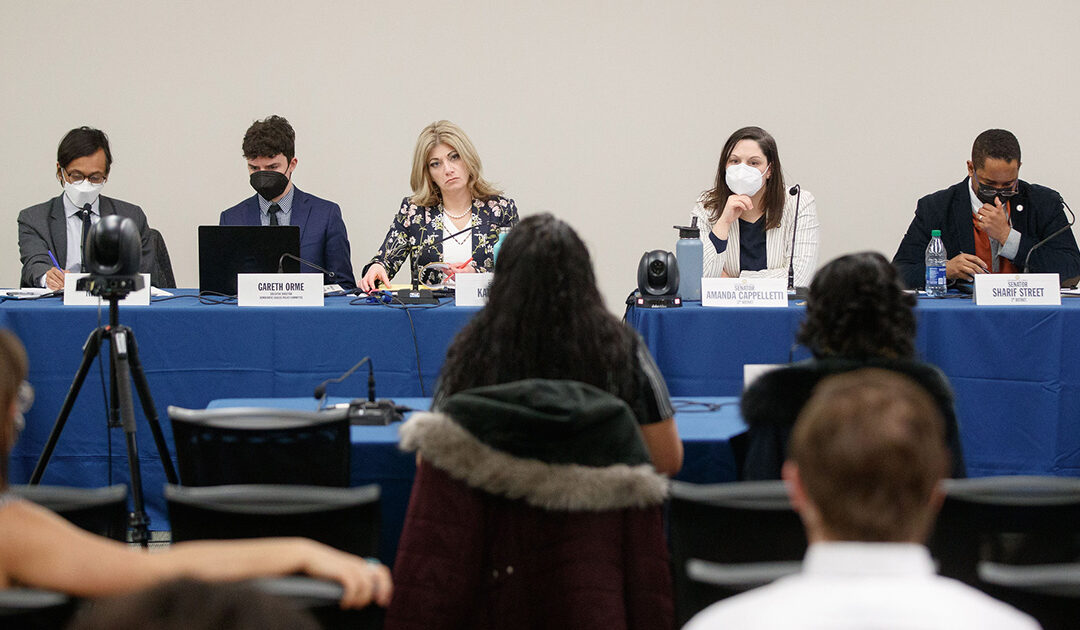
by Christin Brown | March 15, 2022 | News Releases
PHILADELPHIA, March 15, 2022 – State Senator Katie Muth (D- Berks/Chester/Montgomery), Chair of the Pennsylvania Senate Democratic Policy Committee, joined Senators Sharif Street, Nikil Saval, Amanda Cappelletti, Tina Tartaglione and Art Haywood to host a public hearing on housing scarcity and contemporary houselessness yesterday at Temple University.
“We need to tackle the issue of economic injustice – from raising wages to actual living wages and ensuring rent and housing prices are fair, transparent, and flexible according to each individual’s financial situation,” Muth said. “All levels of government need to implement policies that ensure public dollars are actually helping the public, not the wealthy, private real estate and private equity firms making billions off of taxpayer funded subsidies and evicting people who can’t afford to pay skyrocketing rent and housing rates. I hope our hearing and the impassioned testimony provided by actual Pennsylvanians living these challenges forces this conversation into the ongoing budget debate and into all 67 counties and local government priorities.”
The policy hearing featured three panels of participants who presented testimony and discussed personal stories about housing scarcity, houselessness, and the government’s responsibility to provide safe, affordable, and accessible housing in Pennsylvania.
“The recent tragic fire in Philadelphia’s Fairmount community that claimed the lives of 12, including 9 children, began with a failure of government. A family was forced to make the untenable choice of cramming eighteen individuals into a single unit because of a lack of resources. Housing is security and dignity. Years of divestment from every level of government have been an abdication of government’s duty to protect the communities they serve,” Street said. “The fundamental question for society and government is ‘how do we create accessible, safe and affordable housing for all?’ I look forward to joining my colleagues in creating policy to address the critical issue of housing scarcity.”
Testifiers at the hearing included Gail Loney, a North Central Philadelphia resident; Alisha Robinson, a Frankford resident; Kelvin Jeremiah, president and CEO, Philadelphia Housing Authority; Aaron Zappia, Senior Government Relations Manager, Housing Alliance of Pennsylvania; Andrew Frishkoff, Executive Director, Philadelphia Local Initiatives Support Corporation (LISC); and Stephanie Sena, Anti-Poverty Fellow & Housing Advocate, Villanova University Charles Widger School of Law.
“The housing crisis is not unsolvable—we need to act to ameliorate it at every chance we get,” Saval added. “That means raising wages, building equity into our systems, and preserving affordable housing by giving people what they need to repair and maintain and stay in their homes.”
All submitted testimony from the policy hearing and the full video is available at SenatorMuth.com/Policy.
# # #
Testimony
Panel 1: Lived Experience
- Gail Loney, North Central Philadelphia Resident
- Alisha Robinson, Frankford Resident
Panel 2: The Philadelphia Housing Authority
Panel 3: Policy Solutions
Additional Testimony
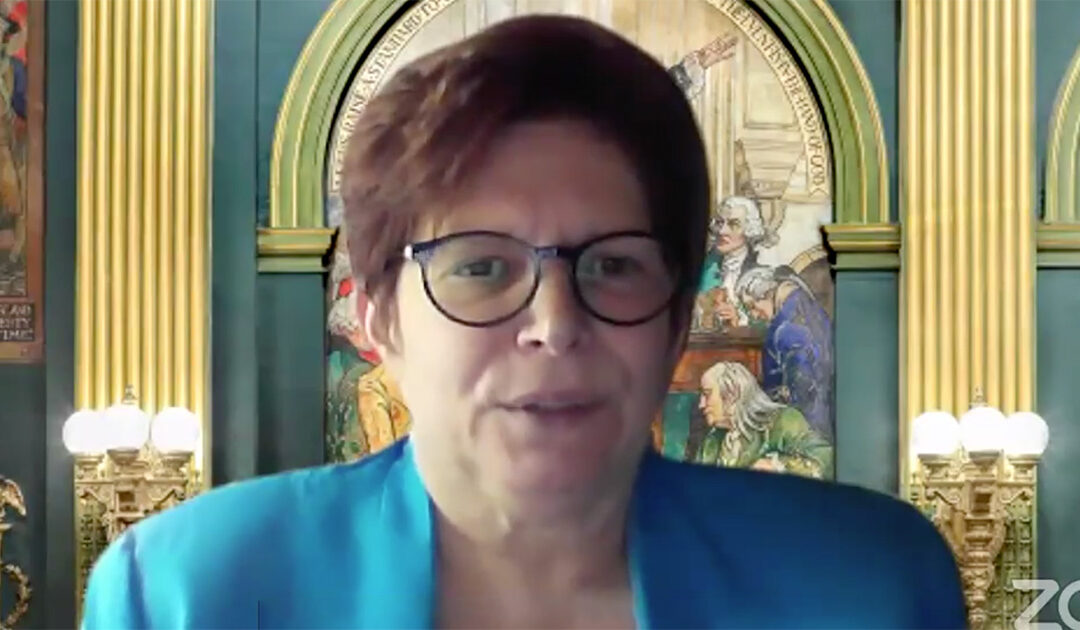
by Christin Brown | April 30, 2021 | News Releases
Harrisburg – April 30, 2021 – At the request of Pennsylvania State Senators Judy Schwank (D- Berks), Tina Tartaglione (D- Philadelphia), and Sharif Street (D- Philadelphia), the Senate Democratic Policy Committee held a virtual policy hearing to discuss the issue of food insecurity in Pennsylvania.
“The pandemic has exposed many issues over the last year, but perhaps most striking of all is the issue of food insecurity,” Schwank said. “I know few of us will forget seeing the long lines of families waiting for food assistance. Today we learned how our local food banks met the extraordinary challenge of feeding our communities and what we need to consider moving forward as the issue of food insecurity is far from solved.”
Pennsylvania Secretary of Agriculture Russell Redding said that reports compiled by the organization Feeding America show that the number of Pennsylvanians facing food insecurity in 2020 grew substantially to 1.77 million individuals, an increase of 30 percent. The number of children in Pennsylvania facing food insecurity rose to 537,080, an increase of nearly 40 percent in just one year.
“Food Insecurity is defined as the lack of access to enough food for a healthy and active life and at its core equals hunger. Across the Commonwealth of Pennsylvania, it is estimated that 11% of the population is food insecure with the highest percentage right here in Philadelphia county,” Dixie James, President and COO of Einstein Healthcare Network, said.
Second Lady of Pennsylvania, Gisele Fetterman, also testified at the hearing about her work to address food insecurity through Free Store 15104 and 412 Food Rescue.
“My work exists because of failures in policy,” Fetterman said.
She said that making a state law to prevent perfectly good food from going to waste, as numerous other states have done, would help to address food insecurity by redirecting resources, and also addressing the environmental impact of discarding perfectly good food that could otherwise feed populations.
“We know it is not a lack of food, it is how food gets distributed,” Dr. Kathy Reeves, Senior Associate Dean of Health Equity, Diversity & Inclusion and Director at the Center for Urban Bioethics and Professor of Pediatrics Lewis Katz School of Medicine at Temple University, said.
Dr. Reeves also advocated in her testimony to treat food as a prescription to address the overall health of Pennsylvanians.
“Food insecurity is intertwined with so many of Pennsylvania’s chronic ills, problems like poverty and health disparities that have been exacerbated by the lingering coronavirus pandemic,” Senator Tartaglione said. “This thorough conversation is imperative as we seek to make nutrition universally accessible in the Commonwealth.”
Loree Jones, CEO of Philabundance which serves five counties in Pennsylvania, said that 40 percent of the 60 percent increase Philabundance has seen in need this past year were people using the emergency food system for the first time. She said that Feeding America is projecting that nationally more than 42 million people, including 13 million children, may experience food insecurity due to COVID-19.
Secretary Redding said that additional funding to provide food in the pandemic has come from both federal and state resources, providing additional funding for United States Department of Agriculture (USDA) foods purchases through The Emergency Food Assistance Program (TEFAP). As of April 17, 2021, food banks in Pennsylvania report having distributed in excess of 2.4 million of these food boxes, weighing more than 51.5 million pounds.
“The lessons learned over this past year have provided us a fresh lens to look at our grant programs to ensure they are equitable and meeting the needs of those we serve. The gaps in the system have been highlighted such as meat processing delays and lack of access to fresh foods. We will continue to enhance our current programs and investigate additional ways to address these needs,” Sec. Redding said. “Additionally, expanding broadband access throughout the commonwealth will assist in providing equal access to resources and e-commerce platforms.”
Scott Cawthern, Acting Deputy Secretary for the Office of Income Maintenance at the PA Dept. of Human Services, also testified about the work that the Dept. of Human Services did in expanding services during the COVID-19 pandemic, and how increased and continued investment in these programs will address food insecurity and improve long-term health outcomes for Pennsylvanians.
“On the state level, we would like to see more coordination between all the food 9 systems in the state including the Special Supplemental Nutrition Program for Women, Infants, and Children (WIC), SNAP, NSLP, and others to ensure that eligible families are receiving all the food assistance for which they qualify and to ensure that children and families receive the nutrition supports as they grow,” Cawthern said.
Jay Worrall, President of Helping Harvest Food Bank, testified to the importance of community partners in the distribution of food and resources to families and how increasing funding for its signature food insecurity programs, the State Food Purchase Program (SFPP), and the Pennsylvania Agricultural Surplus System (PASS), and increase the flexibility for how those funds can be expended would assist even more Pennsylvanians in need.
“Unfortunately, many Pennsylvanians have been and still are struggling to meet their basic needs. Working families across our state face countless situations, such as jobs paying only poverty wages due to wealth inequality and corporate greed, food deserts, unexpected bills for car maintenance or medical treatment, layoffs, and now a global pandemic, all of which cause temporary or permanent financial instability, food insecurity and hunger. Pennsylvania food insecurity rates have increased from 11.1% in 2018 to over 33% as of March 2020. According to the PA Department of Agriculture, before the COVID-19 pandemic, more than 1.53 million Pennsylvanians endured chronic hunger every day, including 478,500 older Pennsylvanians and about 437,000 children,” Sen. Katie Muth (D- Berks/Chester/Montgomery), chair of the Senate Democratic Policy Committee, said. “Food insecurity makes it impossible to survive let alone thrive. Every human should have guaranteed access to reliable and nutritious meals. We need to act urgently to end food insecurity in Pennsylvania and across our nation.”
Below are all who participated in today’s hearing:
- Dixie James, President & COO, Einstein Healthcare Network
- Gisele Fetterman, Second Lady of Pennsylvania
- Secretary Russell Redding, PA Department of Agriculture
- Scott Cawthern, Acting Deputy Secretary for the Office of Income Maintenance at the PA Dept. of Human Services
- Dr. Kathy Reeves, MD. FAAP, Senior Associate Dean, Health Equity, Diversity & Inclusion Director, Center for Urban Bioethics – Professor, Pediatrics Lewis Katz School of Medicine, Temple University
- Andy Toy, Development and Communications Director, SEAMAAC
- Tyler Ray, Neighborhood Community Organizer, Urban Creators
- Maddy Booth, COO, Vetri Community Partnership
- Mark Edwards, President & CEO, Food Trust
- Loree Jones, CEO, Philabundance
- Jay Worrall, President, Helping Harvest Food Bank
The full recording of this roundtable, as well as the written testimony from participants, can be found at senatormuth.com/policy. A full recording of this hearing can also be found on the PA Senate Democratic Facebook page.
###
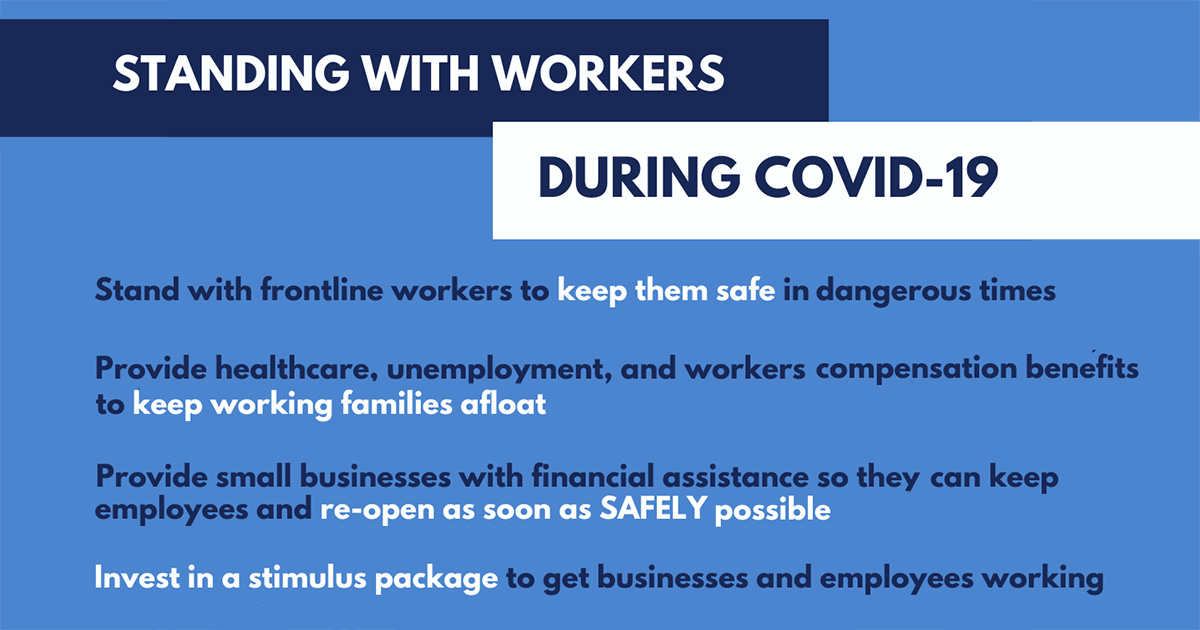
by Christin Brown | April 8, 2020 | News Releases
Harrisburg, PA − April 8, 2020 − The Senate adjourned Tuesday afternoon after the House Republicans indicated they would not be taking up Senate Bill 841, legislation that would have enabled local municipalities to hold their meetings remotely, permitted e-notary use; lengthened the time period a property tax payer can receive an early payment discount and delay penalties for late payments to Dec. 31st; and allowed businesses to make delayed payments on EITC. Another important amendment offered by Senator Pam Iovino (D-Allegheny) allowed school districts to renegotiate contracts to ensure contracted school workers can get paid and continue to receive benefits.
The amended SB 841 passed the Senate with bipartisan support. While the Senate Democrats and Republicans chose to put partisan difference aside, the House Republicans were pushing to please special interests and big donors. Intending to use this crisis as leverage, Speaker Turzai and his caucus passed legislation to prematurely allow businesses to reopen during this public health crisis and create a partisan task force to interfere with the Governor’s disaster response, both of which unnecessarily risk lives and threaten to expend the emergency.
“While the Governor and Department of Health Secretary offer leadership on public safety in daily briefings and Democratic members of the PA House and Senate draft legislation to protect working people who are either out of work or employed on the front lines of essential businesses, Republicans are putting lives at risk and undermining the Governor and Secretary Levine’s best efforts to end this crisis,” said Senate Democratic Leader Jay Costa, Jr. “Instead of taking the advice of our Health Secretary, they are trying to slow down our response and hasten the re-opening of non-essential businesses against the guidance of every public health entity in the country.”
The House Republicans were seeking even more egregious measures to provide civil immunity to big businesses, upend school districts ability to pay their teachers, and leave our corrections department employees at serious threat of the Coronavirus. Perhaps worst of all, the language does nothing to protect frontline workers, provide assistance to those that are out of work, or to help small businesses weather this crisis.
In an amendment to Senate Bill 327, House Republicans designed a task force with partisan appointees to usurp the Governor’s ability to rapidly respond to this quickly-evolving crisis. Their bill would require the Secretary of Health to leave PEMA, take hours away from public health crisis planning and defend her work in front of a redundant, political body.
The Senate Democratic Caucus will not support these bills. Alternatively, this caucus will be supporting legislation on the following issues:
- The American Working Family Relief Action Plan for front-line worker protections (Collett/L. Williams)
- Protecting workers during public health emergencies (Santarsiero)
- COVID-19 Food Worker Safety Act (Tartaglione)
- COVID-19 Grocery Store Worker Safety Act (Tartaglione)
- Payment of contract services in schools (Iovino)
- Childcare assistance (Schwank/L. Williams)
- Emergency expansion of the Family Medical Leave Act to provide paid sick leave (Farnese)
- Crisis grants for volunteer fire and EMS companies due to COVID-19 (Brewster)
- Require business interruption insurance to cover COVID-19 related business closures (Hughes)
- Eviction protection for all disaster emergencies (Farnese)
- Coronavirus disease and schools: allowing for online instruction (Dinniman)
- Creating a Common Wealth Fund to collect donations from individuals to provide for essential needs of those in need (AH Williams)
- Providing a presumption of eligibility for Workers’ Compensation benefits for workers that get sick in the workplace (Tartaglione)
- Ensuring receipt of a stimulus check from the Federal government is not included in an individual’s income for purposes of qualifying for social safety nets (Schwank)
- Exempting stimulus checks from the Federal government from State and local taxation (Brewster)
- Collaborating with financial institutions to mandate mortgage loan forgiveness, assistance to homeowners that were laid off due to state emergencies (Farnese)
“While many working Pennsylvanians are suffering from the COVID-19 pandemic, facing lost hours or even complete unemployment, others who find themselves in more fortunate circumstances have expressed a desire to help their fellow citizens by either donating to a local charity or patronizing local businesses,” said Senator Anthony H. Williams. “By establishing the “Pennsylvania Common Wealth” restricted account, taxpayers could redirect all or a portion of their stimulus check to the state, which in turn would be authorized to direct those funds into programs which help the neediest Pennsylvanians – property tax & rent rebates, temporary assistance for needy families, CHIP or medical assistance.”
“Pennsylvania needs solutions that help protect its working people who have been hit the hardest by the fallout of the coronavirus pandemic,” Senator Vincent Hughes said. “We in the Pennsylvania Senate Democratic Caucus have put forth a number of policy proposals that would do just that, meanwhile House Republicans have chosen to ignore these needs and push an agenda that jeopardizes public health and puts additional pressure on working people by delaying immediate relief. Our mission should be helping people in this unprecedented time of need and we will remain vigilant in protecting hardworking folks across the commonwealth.”
“As public servants, our most important duty is to protect the health, safety and welfare of our citizens. This includes making difficult decisions in challenging times. We all want businesses to reopen, employees back on the job, students back in classrooms and some semblance of normal life to resume, but that cannot happen unless we first continue mitigation efforts and follow the advice of our scientists and experts,” said Senator Wayne D. Fontana. “Anything contrary can set back progress and cause further harm on our economy and most importantly, on human health. The bipartisan legislation the Senate approved provides some necessary guidance and relief to local governments, businesses, school employees and property taxpayers during this unprecedented situation. It is unconscionable that House Republicans blatantly disregarded that duty and have chosen not to act.”
“The spread of coronavirus has not quieted the voice of special interests in Harrisburg and that’s tragic,” said Senator Larry Farnese. “Mitigation through isolation is working and we have to recognize that sacrifice through legislation that actually helps front-line workers instead of just saying nice things on social media.”
“This crisis and the Commonwealth’s response to the COVID-19 pandemic requires leadership, transparency and cooperation – not partisan politics,” said Senator John Blake. “While we’ve worked well with the Senate majority on real solutions that actually help people in this crisis, the House majority looks to undermine the executive authority of the Governor as well as the advice of medical and scientific experts regarding public health. I applaud the work being done by Governor Wolf and his administration to keep Pennsylvanians safe and to mitigate the spread of COVID-19. I will continue to support important legislation to help our business community, front-line workers and medical professionals; and to protect our citizens, schools and local governments across this state. We need to remain vigilant in following the recommendations of the PA Department of Health and the federal CDC.”
“Issues that the Commonwealth was already facing have been exacerbated by this pandemic, and child care services and early learning programs are near the top of the list. Childcare centers are teetering on the brink of insolvency, which is why part of our legislative package addresses early childhood learning and safe, quality childcare. We will not be able to restart Pennsylvania’s economy without this key component,” Senator Judy Schwank said. “Additionally, it’s vital that the income requirements of state programs like PACENET and Property Tax and Rent Rebate are adjusted so that Pennsylvanians receiving federal aid are not penalized later.”
“The key to an effective response to the pandemic is to ensure that our citizens are protected, health risks are addressed, and our economy restarts quickly,” Senator Jim Brewster said. “That’s why I introduced a six-point stimulus plan that will help small business, protect workers and create jobs once we are clear the threat posed by the pandemic. In addition, we need to make sure to address the immediate and long-term needs of first responders and all workers and businesses who are providing essential services during this time of extraordinary stress.”
“There is no segment of our Commonwealth that hasn’t been upended by this crisis. Everything is a priority. But in order to save livelihoods, we must first save lives,” said Senator Maria Collett. “As a nurse, I know firsthand the challenges our health care workers are up against and the urgency of passing legislation like the American Working Family Relief Action Plan for Front-Line Workers. Our doctors, nurses, first responders, senior care aides and others should not have to worry about getting sick or infecting others while performing their essential work.”
“It is irresponsible for the state to reopen businesses at the height of the COVID-19 outbreak. Those who are not essential workers should remain home,” said Senator Art Haywood. “We need to do all we can as legislators to support essential employees risking their lives on a daily basis,” said Senator Haywood (D-Montgomery/Philadelphia). “I will continue to support the work Governor Wolf and Secretary Levine have done to inform the public to remain safe and stay home.”
“The citizens of Pennsylvania are counting on their elected representatives to save lives by responding swiftly, pragmatically, and in a bipartisan manner to slow the spread of this highly contagious virus,” said Senator Pam Iovino. “To fulfill our duty to the public, we must follow the consensus guidance of public health professionals, focus on protecting front-line essential workers, and put in place protections that allow furloughed or unemployed workers and small businesses to weather the economic disruption.”
“As the Democratic chair of the Local Government Committee, I worked with stakeholders for weeks to craft the provisions of SB 841, I am disappointed these commonsense measures, which passed the Senate with bipartisan support, are being held up by House Republicans for little reason,” said Senator Tim Kearney. “The House should immediately pass SB 841 and focus on bringing relief to Pennsylvanians, rather than sabotaging the Governor’s efforts to keep our families safe.”
“Yesterday, the majority party in both chambers failed to use their legislative power, where they can literally pass any bill they want to, and instead decided to pack up and go home without,” said Senator Katie Muth. “Failing to pass meaningful bills when people are fighting for their lives is simply negligent.”
“Now is not the time to play politics,” said Senator Steve Santarsiero. “Saving lives has to be the first priority. In order to do that, we must all do our part and follow the Governor’s and Department of Health’s plans as they’ve been explained to us countless times. SB 841 is just one of many ways our caucus has worked in a bipartisan effort to provide relief to those who need it most. However, SB 327 is exactly what our healthcare professionals warn us against. Promoting a premature return to normalcy will only undermine our effort to keep the public safe, and further endanger thousands of lives.”
“Government’s most important role is the protection of its people. Since the COVID-19 crisis the Senate has met three times, with little to show for it. Communities across the commonwealth have no interest in the paralysis of government especially in the most desperate of times. What they do care about is the protection of our essential workforce, the interruption of our small businesses, job loss, staying in their homes and educating their children. The only thing that matters is the preservation and protection of every resource needed to keep families safe during this health crisis,” said Senator Sharif Street.
“We need to be back in Harrisburg, we need to get back to work. We must work together to ensure our communities are protected during uncertain times.”
“As thousands of Pennsylvanians continue to get sick and hundreds die, now is no time to play partisan politics,” Senator Tina Tartaglione said. “As public leaders, we must unite behind the common goal of reducing the threat of this virus and mitigating the harm being done to our constituents. The package of bills we have proposed will directly help all Pennsylvania families, including essential workers, displaced workers, first responders, school children, those who have become sick, and those in need. I urge all legislators from all political parties to support these bills.”
“Stopping the spread of COVID-19 and saving lives is our top priority. We also need to protect and support our constituents, our communities, and our businesses,” said Senator Lindsey Williams. “Our front-line essential workers – our hospital workers, grocery store workers, emergency service personnel and others – cannot afford to wait for PPE. They needed it weeks ago. Our childcare facilities need our help to stay open and provide care to the children of our essential workers while they risk their lives for us. Our small businesses need financial support to stay afloat. Our municipalities need the ability to meet remotely and make decisions that will ensure the safety of all of residents. There are a lot of needs right now and our constituents do not have time for us to waste playing partisan games or naming bridges. The Senate Democrats have offered concrete solutions that will help people. We should all be working together to get them to the Governor’s desk for signature as soon as possible.”
More information on the work of the Pennsylvania Senate Democratic Caucus during the COVID-19 crisis can be found at pasenate.com/covid19.
###
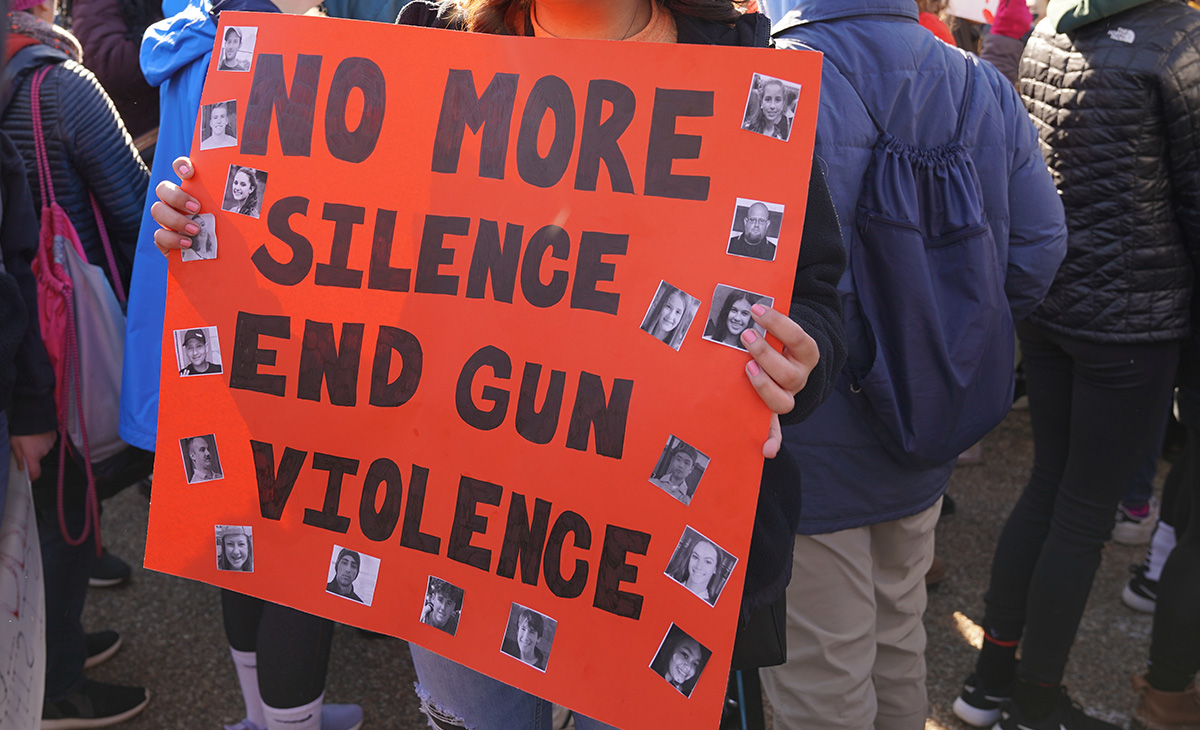
by Christin Brown | June 24, 2019 | News Releases
Harrisburg, Pa. − June 24, 2019 − Members of the Pennsylvania Senate Democratic Caucus today jointly sent a letter to Governor Tom Wolf requesting a disaster declaration for gun violence in the Commonwealth.
“We believe it is necessary to raise the public’s awareness of the massive loss of human life and the suffering inflicted on affected family, friends and neighbors where this tragedy is unfolding daily,” they wrote. “Just as you have signed six disaster declarations to provide every tool at the Commonwealth’s disposal to combat the opioid epidemic, the death toll and impact from illegal guns should merit immediate and coordinated attention.”
Specifically, a disaster declaration could do the following:
- Establish a task force led by the Department of Health to create and implement a public health framework for addressing gun violence
- Establish a command center in the Pennsylvania Emergency Management Agency to coordinate state and local law enforcement response
- Enhance the Joint-Local State Firearm Taskforce through additional personnel and funding to take illegal guns off the street
- Expand information gathering and sharing between all levels of law enforcement and community groups
- Increase law enforcement presence, both local and state, in targeted areas where gun violence is most prevalent
- Expedite and expand grants and other funding sources for community groups and nonprofit associations with a proven record of violence reduction and prevention
- Provide additional state resources for behavioral and mental health
- Bringing to bear the significant wealth of knowledge and experience in the Departments of Health and Human Services to provide de-escalation and de-confliction training throughout the community
- Require the Pennsylvania Department of Education provide training and professional development on trauma-informed education
View full letter →
###

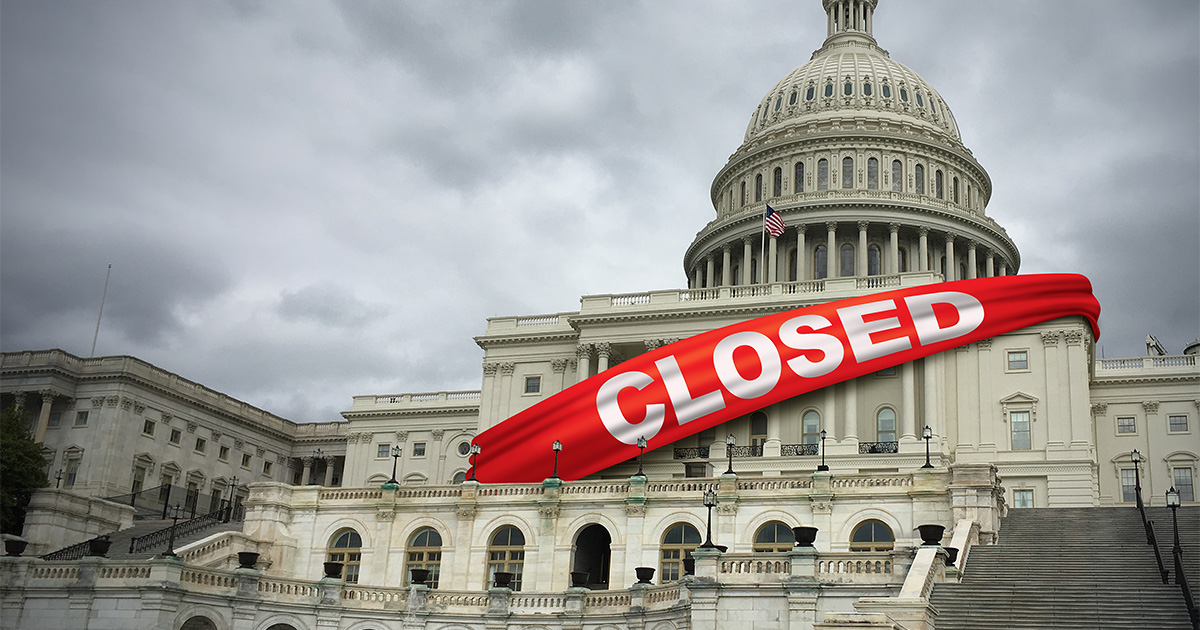
by Christin Brown | January 10, 2019 | News Releases
Harrisburg, PA – January 10, 2019 – On behalf of the 12,000 Pennsylvania federal employees, contractors and subcontractors who are not receiving a paycheck during the partial federal government shutdown, Senator Vincent Hughes (D-Philadelphia/Montgomery), Senator Christine Tartaglione (D-Philadelphia), Senator Sharif Street (D-Philadelphia) and Senator Jay Costa (D-Allegheny) are taken steps to help those in need.
After hearing reports from constituents facing financial hardships during the shutdown, the senators wrote the 10 largest banks, relative to number of branches, in Pennsylvania. Their hopes are to share information about banks’ existing assistance programs or to spur action on behalf of working people with banks that have not addressed the issue.
“Ten years ago, we bailed out failing banks during a recession and now it is time to help working people during their financial crisis,” Sen. Hughes said. “These hard-working folks are suffering through no fault of their own. The least we can do is get them help until are get paid again.”
Motivations for the letter came from the senators understanding that 78 percent of U.S. workers live paycheck to paycheck and there are no furloughs for essential expenses. Mortgages, rent, groceries, car payments and other bills must be paid whether the government is functioning.
“We cannot stand by and do nothing while these federal employees are left without paychecks,” said Sen. Costa. “These are folks ready and willing to work in service of the federal government, but now face eviction and piling bills. I hope that financial institutions are willing to step up to help them, and I’ll do everything in my power to ensure these federal employees are not punished for this shutdown.”
In total, there are 62,000 federal workers in Pennsylvania and about 12,000 who are furloughed or working without pay. Nationally 800,000 federal employees have had their jobs disrupted, with 380,000 furloughed or sent home without pay. These figures speak to an economic crisis that must be addressed, the senators said.
“As the stalemate in Washington is about to enter its fourth week, thousands of hard-working Pennsylvanians are suffering a very heavy burden,” Sen. Tartaglione said. “I can’t think of any greater commitment to purpose and level of professionalism than we are seeing from those who want to work, but can’t, and from those who continue to work, but aren’t receiving their just compensation. It is imperative that we do all we can as a community to support them in their time of need.”
Rallies and protests across Pennsylvania also drew the attention of the senators who have made the fight for working people a central issue. Pennsylvania’s furloughed federal workers not receiving paychecks include TSA officers, federal prison workers, national park workers and employees of the Environmental Protection agency.
“The financial strain placed on federal government employees, contractors and subcontractors in the commonwealth continues to grow,” Sen. Street said. “This is a heavy burden on individuals and families who they cannot endure such hardships for an extended period of time. Banks have an opportunity to mitigate these hardships and must help the people. As the Democratic chairman of the Banking and Insurance Committee, I encourage the banks to act with urgency in this regard.”
The full letter to the banks can be found here.
###
by Christin Brown | October 24, 2017 | News Releases
Harrisburg, PA – October 24, 2017 – This morning, elected officials stood with advocates to push for an expansion of Pennsylvania’s hate crime definition.
As state law currently stands race, color, religion or national origin are protected classes under the hate crimes statute. Pending legislation in the Senate (SB 96) and House (HB 505) would reenact Act 143 of 2002 and again extend these protections to include ancestry, mental or physical disability, sexual orientation, gender, and gender identity.
Republicans, Democrats, Representatives, Senators, activists, and the Lieutenant Governor all expressed their disappointment that this bill is not yet law – and urged the General Assembly to move quickly to protect more Pennsylvania citizens from hate crimes.
“I think we’ve all watched the news lately and seen unspeakable acts of violence and discrimination being waged against targeted groups and individuals. We’ve seen people in the disability community targeted, we’ve seen LGBT people targeted, we’ve seen black, Jewish, Muslim, and Latino people and communities targeted across the country and right here at home,” said Senator Larry Farnese (D-Philadelphia), the prime sponsor of the Senate Bill, said. “We must not allow these discriminatory practices to continue, nor allow unprotected populations to remain unrepresented here in this building.”
“If you can’t find it in your heart to protect vulnerable citizens from bigotry fueled violence, maybe you can look at your wallet,” said Lieutenant Governor Mike Stack. “The job creators of the 21st century, like Amazon, want to do business in a state where their employees — all of their employees — are valued and protected. Holding up civil rights legislation in our legislature sends the wrong message about what kind of state we are.”
“Pennsylvania’s lack of protections against hate crimes for LGBT communities and persons with disabilities is a national embarrassment. We remain the only state in the northeast to not enshrine protections against hate crimes for these groups into law,” Representative Kevin Boyle (D-Philadelphia), the prime sponsor of the House bill, said. “I have introduced this bill for two consecutive sessions to add these protections but it has never been brought to a vote. Our legislature is failing its duty to protect the citizens of this commonwealth, and ignoring the constitutional rights of the physically and intellectually disabled, and the LGBT communities.”
“For those of us who revere the Constitution and appreciate the deep sense of liberty it enshrines, expanding hate crimes protections to include ancestry, disability, and gender identity is the right thing to do in Pennsylvania and around the country,” said Senator Anthony Williams (D-Philadelphia).
“By expanding the groups covered by hate crime laws, we are telling everyone that their human and constitutional rights are sacrosanct, and those who attempt to cripple those rights will face the full force of the law,” Representative Thomas Murt (R-Montgomery) said.
“Hate crimes are not committed to cause fear in one person; they are done to cause fear to an entire group – to send a message,” Representative Dan Frankel (D-Allegheny) said. “Well, the Pennsylvania General Assembly can send a message this year by passing House Bill 505 and Senate Bill 96. We can send a message that hate crimes based on a person’s ancestry, mental or physical disability, sexual orientation, gender, or gender identity will not be tolerated in any corner of this state. As recent events around this country make clear, we must update our laws now to protect more people from heinous acts of violence and hatred.”
“The Philadelphia Bar Association supports and encourages enactment of an amendment to the Pennsylvania ethnic intimidation law to add protections for ancestry, mental or physical disability, sexual orientation, gender or gender identity,” said Philadelphia Bar Association Chancellor Deborah R. Gross.
For more information and action on the bill, please visit the Legislative Action Network of the Philadelphia Bar Association http://www.philadelphiabar.org/page/LACTakeAction3?appNum=3
by Christin Brown | October 3, 2017 | News Releases
Harrisburg – October 3, 2017 – A Senate resolution urging the President and Congress to make emergency financial assistance available for Puerto Rico as it seeks to recover from the devastation wrought by Hurricane Maria was introduced today by state Sen. Christine M. Tartaglione (D-Philadelphia).
“Hurricane Maria left a trail of death and destruction in its wake,” Tartaglione said. “The federal government must move swiftly and bring resources to the island to relieve suffering and despair.
“There are American citizens in need of our help. They are depending on an effective government response.”
Tartaglione, along with resolution co-sponsors Sen. Sharif Street (D-Philadelphia) and Judy Schwank (D-Berks), gave speeches on the Senate floor in support of the aid for Puerto Rico, which is called for in Senate Resolution 211.
In her floor speech, Tartaglione said that the debt crisis had already strained the island’s infrastructure and its resources were spread thin and now the hurricane has made those problems exponentially worse.
“We have all seen the horrific images of the devastation,” Tartaglione said. “We are urging that emergency financial resources are swiftly made available to assist the residents of Puerto Rico so they may return to their normal everyday lives.”
Pennsylvania ranks fourth in the number of Puerto Ricans who live in the United States, with one-third residing in Philadelphia.
-30-

